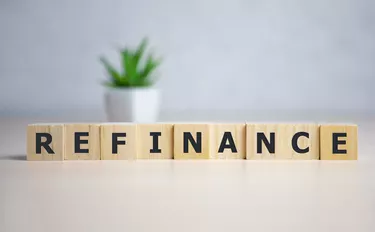
Debt can pile up. Credit card debt, student loans and miscellaneous other high interest debt can quickly swallow your paycheck. Depending on your credit score, a credit card interest rate can run from 13 percent to roughly 24 percent. So, paying that high interest rate makes it hard to pay down the principal. It may seem like you'll never get out from under it.
Mortgage Refinance Option
Video of the Day
Refinancing a home to consolidate debt is an option. Homeowners can tap into their home equity and take advantage of a low interest rate through refinancing. But when does it make sense to refinance and are there benefits to a credit score?
Video of the Day
When mortgage rates are low, debt consolidation makes sense. A cash-out refinance replaces your existing loan with a new one. The new one usually has a lower interest rate or a shorter term. Some have both. You're often borrowing on the equity in your home as well.
By reducing your mortgage interest rate and taking a cash-out, it makes funds available to reduce debt that has higher interest rates. This could increase your cash flow.
Consider also: What Is a Mortgage Specialist?
Mortgage Refinancing for Debt Benefits
Cash-out refinancing lets you borrow for less than a home equity loan or a personal loan would. In addition, it's a better interest rate than even the lowest credit card could offer. And although credit card interest is not tax deductible, mortgage interest rate may be.
By refinancing to pay debt, your credit score should improve.
With cash-out refinancing, you're paying installment debt rather than the revolving debt you pay with credit cards. Installment debt always has the same monthly payment. While with revolving debt, the payment amount changes monthly.
Mortgage Refinancing for Debt Downsides
There are a lot of benefits to refinancing your mortgage to pay debts, but you need to be aware of a few items.
For one, you're resetting the clock. If you're already ten years into your current mortgage, you'll, unfortunately, be starting over. So, if you had a 30-year loan with ten years paid, you're now back to having 30 years to pay. So it's now turned into 40 years of paying on your home.
Your mortgage payment may be more than it previously was. Sometimes refinancing increases your monthly payment. You also must pay closing costs on the new loan.
Not having a plan to keep from running debt up again is a downside. If you don't stay on top of your financial situation by avoiding unnecessary debt, you could be worse off than before refinancing.
Unsecured Debt vs. Secured Debt
The biggest downside is the type of debt you'll be taking on when you refinance a mortgage to pay debt.
Credit cards are unsecured debt. There's no collateral. If you default, they'll demand payment or could garnish your wages. But, except for a bad credit score, you won't lose your home.
That's not the true when you refinance a mortgage. It's secured debt. Your home is collateral. So, if you don't make your mortgage payment, you might have to deal with foreclosure.
Consider also: How to Apply for a Mortgage
Applying for a Mortgage Refinance
Talk to a lender and discuss your current mortgage and what available refinance rates. The process for a refinance is the same as the process was for your original mortgage.
Another appraisal is required. Your credit score and credit reports will be examined. The lender will need bank statements and other personal financial information. They may also want to see a summary of debt that will be paid off.
A lender will likely only allow up to 80 percent withdrawn when tapping into home equity. Some lenders will go up to 90 percent. But to do this, you might have to pay private mortgage insurance. This could add to the loan costs.